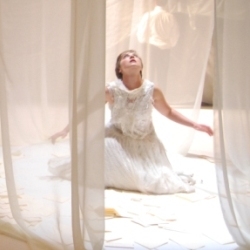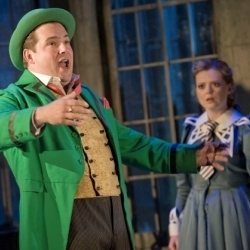Werther (Arcola Theatre)
WOS Opera Poll winner Aylin Bozok returns to the Grimeborn summer festival with Massenet’s dark romance

Thematically if not musically, Massenet’s romantic love quartet has much in common with Debussy’s Pelléas et Mélisande, the opera that led to that Poll win. Both tales are slender and unfold in a self-absorbed world of needy passions where everyday life shrinks to the periphery as irrational love consumes the protagonists.
The Opéra-Comique in Paris rejected Massenet’s manuscript, finding it tedious and lugubrious, and on paper it’s easy to see why. Sophie loves Werther who loves her sister Charlotte who is betrothed to Albert – and that’s pretty much it. Yet in a good production Massenet’s treatment of his Goethe-inspired material can sweep you away.
And Bozok’s account is a revelation. Stylistically her work echoes the Shared Experience school of expressionism, using simple physicality and unflashy visual clues to flesh out the characters’ hinterland.
Lace is the dominant fabric, both scenically and in Bora Asku‘s strikingly off-centre costumes. Charlotte’s delicacy and unhappiness are suggested in her frayed, aged dress, like the clothes on a forgotten doll, while the emotionally unstable Werther is a tatterdemalion in tailcoat and bedroom slippers. In an apparent nod to Polly Teale’s landmark production of A Doll’s House, guilt-visions of her mother (Ada Burke) – to whom she had promised on her deathbed that she would marry Albert – follow Charlotte whenever she is carried away by her feelings for Werther.
'Voldman's stylish pianism allows the listener to forget Massenet’s orchestrations'
The opera is abridged to eliminate secondary characters in the early acts, but after the interval – which is when this production overwhelms – little is lost. The disposition of Bozok’s reduced cast within the confines of a small thrust stage is telling and satisfying, and the performances are uniformly fine.
Werther, like all Massenet operas, will collapse without good singers, but the Arcola production boasts Lucy Knight as a bell-like Sophie and Simon Wallfisch (last year’s excellent Pelléas) as a sturdy, oh-so upright Albert. Thomas Faulkner as Le Bailli is a comparably effective presence in his brief early appearances.
The title role is sung by Adam Tunnicliffe, fresh from an eye- and ear-catching appearance in English Touring Opera‘s King Priam, and his beloved Charlotte by the mezzo Katie Bray, who made such a favourable impression in Garsington‘s Vert-Vert earlier this summer. Together these exceptional artists eat up the hot material they share in the last two acts, and the ineffable romance of Werther’s ‘Pourquoi me réveiller’ emerges less as a mournful aria than a hammer-blow to the solar plexus.
Bozok is reunited for Werther with music director Philip Voldman, whose stylish pianism achieves the near-impossible in allowing the listener to forget the absent riches of Massenet’s orchestration.
So it is with the production. Barring one scenic set-piece in the second half, Bozok is content to present the drama unadorned within a bare white box, trusting her aesthetic to prompt the emotional response. By the end of the opera a woman next to me was in floods of tears. I guess she'd painted her own scenery.














